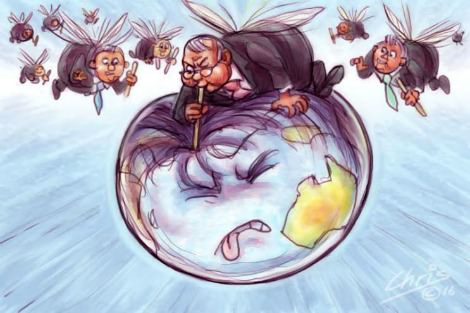Clik here to view.

Serfs sucked dry in the kingdom of banks
11 Comments
David James | 17 April 2016
http://www.eurekastreet.com.au/article.aspx?aeid=47209#.V9NdnaNJnoo
Three finance-related events are currently gaining great attention in the media. One is the so-called Panama Papers, the exposé of tax avoidance on a scale that is absolutely breathtaking.
Image may be NSFW.
Clik here to view. Another is the proposal by the Labor opposition to have a royal commission into the banks. And a third is the furore over the unaffordability of homes and the debate over negative gearing.
Another is the proposal by the Labor opposition to have a royal commission into the banks. And a third is the furore over the unaffordability of homes and the debate over negative gearing.
On the surface they would seem to be quite separate issues. But there is a common element. Banks. All three issues demonstrate yet again that banks are, if not the most malign organisations on the planet, then certainly among the most dangerous.
The role of banks in the tax avoidance case is less obvious, but it is there. The law firm in Panama, Mossack Fonseca, has said in its defence that it does not know who the real clients are. It protested that it only deals with banks or accounting firms, which have specialised in creating a class of wealthy people who can avoid many of their financial obligations to the country in which they are citizens.
Such a reckless approach to social obligations is consistent with the logic of banking. Its only aim is to make money, and the only purpose of clients is to provide an income that can service interest or pay fees. Given free reign, banks will turn entire societies into little more than interest paying vehicles.
In Australia it can be seen with household debt, which is running at over 120 per cent of GDP. It is why houses are out of reach for many young Australians.
As economist Michael Hudson outlines in his book Killing the Host, banks, unleashed by the nonsense idea of financial deregulation, have 'sought to control democracies by shifting tax policy and bank regulation out of the hand of elected representatives to nominees from the world's financial centres'.
It has been a world-wide power grab that has created a new form of serfdom. Instead of funding productive activity, which represents only about 15 per cent of bank lending, they have reinforced rent-yielding privileges for real estate, resources and monopolies.
"American and European authorities decided to save the banks at all cost. The strategy was not only immoral, it was, in the end, impractical. The game is now up."
The banking disaster has been especially pronounced in poorer countries. John Perkins, in his book Confessions of an Economic Hit Man, points out that over the past three decades, 60 of the world's poorest countries have paid $550 billion in principal and interest on loans of $540 billion, yet they still owe $523 billion on those same loans.
The cost of servicing the debt is more than these countries spend on health or education and is 20 times the amount they receive annually in foreign aid. And it is not just developing countries. The recent savage government cuts in Greece were entirely for the purpose of making sure that German and French banks received interest on their loans.
Indeed, in the wake of the global financial crisis — itself an extraordinary exercise in banking recklessness — most of the developed world is under the thumb of banks. American and European authorities decided to save the banks at all cost, even if that meant immiserating everyone else. That is what the policy of 'austerity' meant, making sure that the banks got their interest payments.
The strategy was not only immoral, it was, in the end, impractical. The game is now up. First world debt is now so large it is unpayable, which is why interest rates in most of the developed world are zero and, in some European countries, negative. Average debt to GDP is running at about 170 per cent in developed economies. The only solution is to all but remove the cost on that debt.
In many ways, it is a story as old as the admonition against usury or the practice of debt forgiveness, which Hudson reckons dates back to Bronze Age Mesopotamia. Simple arithmetic indicates that there will always be banking crises because real wealth creation can never keep pace with compound interest. The only difference now is that we are seeing the pattern played out on a global scale.
There are two obvious options. One is to let the world economy continue in its semi-comatose state with the new 'serfs' being kept going by the finance sector parasites so they can perform their primary function of paying interest.
Or there could be debt forgiveness. The first candidate might be the country that has been under the debt cloud longest: Japan. Its debt is currently over 240 per cent of GDP, but it is mostly owed internally so it could be forgiven without a catastrophic loss of sovereignty.
What is also needed is a realisation of just how dangerous banks have become. The misdeeds that have led to calls for a royal commission are just on the surface; the deeper problem is that the finance sector has co-opted the entire system.
As Hudson observes, financial lobbyists have taken the idea of 'free markets' and redefined it as 'freedom from public ownership or regulation'. We have a new sovereign, and it does not have our interests at heart:
'Just as mortgage lenders view rental income as a flow to be turned into payment of interest, international banks view the hard currency earnings of foreign countries as potential revenue to be capitalised into loans and paid as interest. The implicit aim ... is to attach the entire economic surplus for payment of debt service.'